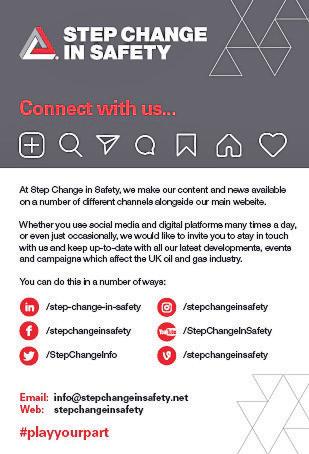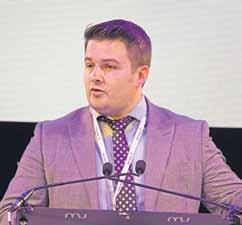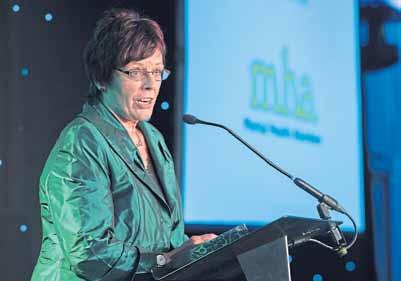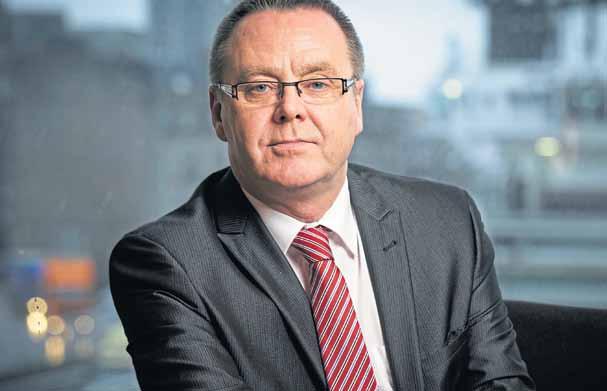A new intervention
Annette Thomas explains raising awareness is just the start of the process P2
As you are reading the Tea Shack News this time, you will see a focus on Mental Health and occupational wellbeing. This effort by Step Change in Safety is in part driven by industry and partly driven by the Workforce Engagement Support Team. Many companies are now recognising that offshore life affects mental health and the mental health you bring on the chopper affects your offshore life.
This year will bring different focus and a growth on the basic steps that were taken last year to kick this process off which is to help those struggling with mental health challenges. The challenge is huge. As a workforce we are quite hardened. Our humour is hard, there is no hiding from issues, we live where we work which is pressure.
they wore crocs, had a North Sea Tiger Tattoo or was attached to their protein shake bottle.
However, with research, we are realising that the problem is much deeper, and joking aside, the problem can be life threatening for those we work with.

Most of us are involved in intervention programs offshore. We are taught to spot hazards, evaluate risk and intervene to stop our colleagues getting hurt. We are not bad at it, but to be fair, it is relatively easy once you get over the embarrassment of approaching someone and trying not to smile as you point out their mistakes. We are taught to accept help and not to take offence and not to take it personally.
This will require us as an offshore industry to step up and be better. Just when we think we are good, we need to be better. There will be training and focus, and this training and focus is just like learning CPR. You hope you never have to use it, but when you do, you need to and be ready. You will save a life. I think it should be part of your Bosiet and Foet.

Keeping health in mind
Energy giant Shell knows that to be the best, it has to give its best P7
We are now being asked to recognise mental health issues with our colleagues and help them. In the past, we thought this was easy. You know someone had issues if
While we are asked to intervene with mental health, this takes a big change as no matter what, this is personal. It points out a perceived weakness and you are open; the secret is out. Or so it seems.
In closing, most of are dealing with people with mental health issues but are afraid to approach it. This will be a new skill for us to learn on how to help others and how to accept help. This life skill on a positive mental health intervention is not just another “thing”. Please embrace it and realise it is not someone else’s responsibility and if you are suffering and struggling, be kind to yourself and get help now.
Smillie,A part to play for all when it comes to mental healthEngaging workforce to make offshore environment safer Safety rep of the year William Davidson P4 Allan HSSE advisor and member of Step Change in Safety's Workforce Engagement Support Team (WEST)
A part to play for all when it comes to mental health
Raising awareness is just the start of the process, Annette Thomas explains

I am a Mental Health First Aid instructor and in September 2018 I delivered two pilot courses for Step Change in Safety that were very well received and, as a result, I was asked to facilitate a session on Mental Health Awareness at the organisation’s ESR Event in November.
Feedback included “glad this is finally being talked about”; “we need more information and support”; “prevention is better than cure”; “this is something everyone needs to know about” and “companies need to take notice”.
Reading the feedback and thinking about what people had said in the sessions caused me to reflect about why mental health is not talked about more openly. Perhaps one explanation might be when I ask people “what does
mental health mean to you?” very often the replies are examples of mental ill health, depression, anxiety, schizophrenia and other psychoses. In fact a person’s mental health is just one part of their overall health and well being, how we feel about things, how we see the world etc.
So a useful perspective is to think about mental health in the same way as we do physical health.
We all know that if we eat well, exercise more and try to drink in moderation we’ll give ourselves the best chance of staying healthy, all of which are also protective factors for our mental health.
However, doing all these things is no guarantee we won’t catch a cold; get injured, or worse still, take a serious or chronic illness like arthritis or cancer. Similarly, with
our mental health sometimes there are life events like bereavement, relationship breakdowns, financial or job worries or other traumatic events that we can identify as the cause of stress, depression or other mental ill health. However, sometimes the causes of serious and chronic mental ill health issues can be chemical, genetic or a combination of factors.
Another misconception is that mental ill health is a sign of weakness. In fact, it can happen to any of us, men, women, old, young, gay, straight, whatever your job or position. Mental health issues are common with one in four people experiencing them each year. At any given time one in six working age adults have symptoms associated with mental ill health.
It is important to be aware of something that can and does affect everyone so that when someone does experience mental ill health, they receive the same care and help that someone with a more obvious
physical ailment. More discussion and awareness can reduce feelings of prejudice and suspicion and hopefully stop people believing that they must keep their problems hidden.
Not wanting to be labeled, thought less of or, worse, penalised, prevents many people with mental health problems accepting they have an issue and seeking help and assistance to deal with them. Early and appropriate intervention, just
as with a physical illness, improves recovery rates. Raising awareness of mental health issues is the start of the process of tackling them, not the end. Raising awareness is great for creating the environment where those with issues feel able to come forward and seek help but ultimately help needs to be available. Step Change in Safety, companies, unions and individuals all have a part to play in making this happen.
Value in sharing information
Oil & Gas UK Health and Safety Manager Trevor Stapleton looks at the progress made in facing such a complex topic

One in four people in the UK will experience a mental health problem, according to leading mental health charity Mind. Just like physical health, where we think about things which could affect our quality of life such a broken leg or a chronic illness, mental health is a broad area covering a range of categories.
The stark difference between these two areas of our health care is that in most cases, mental ill health isn’t always immediately obvious to our friends, family or colleagues. But we do know that more and more people feel able to talk about mental health, thanks in part to the many excellent public campaigns shining a light on the subject.
Would you know what to do or who to speak to if a friend or family member raised concerns about their mental health? Just as we wouldn’t feel confident in giving medical advice to someone with a physical health problem, it’s important we understand the tools and people we can seek out when we need it, before we attempt to offer advice.
Oil & Gas UK has long worked to bring industry together to understand and share learnings on things which could impact the health and safety of our working environment. Working with Step Change in Safety, HSE and our many member companies, we’re proud to have played a key role in starting conversations which ultimately improve ways of working for our whole industry. The areas where we share

information are driven by what’s important to our members through our forums and workgroups. This is an important part of our governance which ensures we represent the interests of the industry and the hundreds of thousands of people it supports.
Looking to 2019, Oil & Gas UK’s Occupational Health and Hygiene technical group will review mental health good practice across the UK’s offshore oil and gas industry, other industries and health groups.
While this work is in its early stages, we know that it will help our industry in its understanding around this complex topic and help companies provide effective support and guidance to their employees who may be suffering with mental health problems.
This is only the beginning of a discussion of a growing part of the health and safety landscape. It’s important then that we build on our successful approach which has made big improvements elsewhere – that is, working together, sharing lessons and listening.
Change needed for 'One Team'
Working offshore during the holidays brings certain problems to the fore

When the bells chimed for the final time in 2018, many of us were aboard offshore installations. Missing birthdays, Christmas and other special occasions is an unavoidable drawback of an offshore worker’s career. Of course, the benefits of that career outweigh these infrequent disappointments.
If they didn’t, then as crews are often reminded, we are not bound by shackles but rather we are here by choice and should the ever more delicate balance between advantages and disadvantages tip to the side of the latter, then we are free to leave.
Though true, this notion does not negate the fact that an employee’s mental health is vitally important in any workplace, never mind in this hazard-rich environment.
Multiple HSE case studies have been carried out on Mental Health over the years and most, if not all, have provided clear evidence to support the reality that a happy workforce is inherently a safer, more productive workforce. Senior Management aboard the platform I work on seemingly sought to affect this issue by affording most disciplines “a day off”: a chance to relax, watch movies, enjoy ‘FaceTime’ calls with their loved ones and of course, enjoy the “special” meals provided on such occasions.
It was a gesture appreciated by those who received it.
Drill Crew knew a day off would never be granted to them but hoped for at least an extended lunch break – they were not even granted this. We remained outside and carried out heavy lifting operations in strong winds and hail. Special
occasion aside, the men and women stood down for the day would not have been outside in those conditions anyway due to safety parameters clearly defined in their working procedures.
Again, a care that is not deemed necessary for members of the drill crew. Looking through the guidance for “working in adverse weather conditions”, defined limits have been removed and, in their place, the assertion that it is down to the guys carrying out a task to decide when to stop work.
In a workplace that has seen so many job losses in recent years, suggesting to personnel that their opinion or judgment is the primary safety barrier for any operation is negligent and dangerous. Undue pressure is placed on personnel who fear stopping the job will directly affect their career prospects. Judgment will differ from one person to the next and from one crew to another. It invites uncertainty and will eventually lead to an unsafe action.

An example, “man riding operations” are required to progress the job. It is blowing 50knots above the derrick wind walls. The Snr Toolpusher instructs one of the Roughnecks to put on his riding belt and carry out the task.
Thinking of his personal safety, he feels uncomfortable going 60ft in the air in those conditions, another member of the crew who is eager to impress says “I’ll do it!” The concerned Roughneck wants to stop the job. The Snr Pusher says he has no grounds to stop the job as the procedure states it is up to the individual to decide if he can man ride in such conditions. Feeling
pressured, the Roughneck decides to watch on as the task goes ahead.
The keen Roughneck is hoisted to 60ft, the wind takes hold of him and throws his body against the steel “Dolly” tracks. He is lowered to the floor and has suffered bruising to his body and ribs.
Was this “a lucky escape” from an unavoidable situation, or was it an unfair abuse of the safety management system, an abuse that places personnel at risk by failing to define working limits? It is often said: “We are one team!” The rights afforded to others through both welfare and safety suggest otherwise.
This conflict of message and approach correlate strongly with results of a Workforce Engagement survey carried out by our platform
Working days lost in Great Britain
Some 30.7 million working days were lost due to work-related ill health and non-fatal workplace injuries in 2017-18.
• Stress, depression or anxiety and musculoskeletal disorders accounted for the majority of days lost due to work-related ill health, 15.4 million and 6.6 million respectively.
• On average, each person suffering took around 16.5 days off work. This varies as follows:

- 7.1 days for injuries.
- 19.8 days for ill health cases.
- 25.8 days for stress, depression or anxiety.
- 14.0 days for musculoskeletal disorders.
Source: Labour Force Survey (LFS) - self-reported work-related ill health and workplace injuries. The Office for National Statistics is the
Work-related ill health accounts for the majority of working days lost
provider of the LFS data. The analysis of the data is the sole responsibility of the Health and Safety Executive.
For more information, please visit: www.hse.gov.uk/statistics/ lfs/index.htm.
operator. Drilling scored by far the worst.
Disengaged, disillusioned and disgruntled, crews are facing each shift at a greater risk due to the constant neglect of not only their safety but also their mental wellbeing. “One Team” can only exist in an environment that
consistently displays equality. It will remain an ideology unless leadership acknowledge the requirement for change. I hope that when the bells chime at the end of 2019 we will have corrected this imbalance of fairness within the industry.
Anon.
Elected to make a difference
Engaging workforce to make offshore environment safer

William Davidson Safety Rep of the Year, Offshore Safety Awards 2018
I work for Wood as an Instrument Technician on CNOOC International’s Golden Eagle platform and I’ve been an offshore Elected Safety Representative (ESR) for nearly three years. I am also a member of Step Change in Safety’s ESR group which gives members the opportunity to identify and promote exemplary ESR practices. Step Change in Safety’s ESR group also encourages its members to share their experiences and support each other.
As an ESR on Golden Eagle, I am involved in escalated risk assessments, incident investigations, safety rep meetings (SI971), and monthly cross-asset meetings where Golden Eagle, Buzzard, Scott and members of the Aberdeen management team dial-in to share information. ESRs also have opportunities to attend safety rep engagement days.
One area which we have been working to improve on Golden Eagle lately is workforce engagement. We have found running a ‘Card of the Month’ program has helped. We use the Step Change in Safety observation cards as a tool for the workforce to record safe/ unsafe acts or conditions and allow the HSE&A team to gather information and analyse trends. The Safety Reps, Environmental Reps and Hydrocarbon Release Prevention champions select what they feel to be the best cards that month, and the individuals who submitted the
winning cards receive a £25 voucher. One of the most important aspects of being a safety rep is workforce engagement. I’m there as a point of contact to help with any safety concerns and provide a link on safety issues between the offshore and onshore team. On Golden Eagle, we are proud of our safety record. We carry out daily tasks with a safety-first mindset and make use of all the industry leading safety tools which CNOOC International encourages us to use, for example, ‘By Choice’ which is the company’s behavioural safety programme, the 20-second scan, Step Change in Safety’s observation cards and Stop Work Authority.
I hope this encourages other ESRs and the whole offshore workforce to do their best to support their ESRs. If we all work together we can make the UKCS an even safer place to work.
Babcock believes in looking after staff
Babcock’s ‘caring culture’ means taking care of staff as well as passengers. The physical and mental wellbeing of everyone who is responsible for helicopter operations – from check-in staff to operational teams or admin support – is central to safe and efficient operations.
Babcock Offshore’s Head of Safety and Compliance, Gary Cooper said: “Safe operations are fundamental to every helicopter operator, and while we maintain the highest standards when it comes to air operations, safety and health starts and stops with our people. So, it’s incredibly important we give them all the support we can to ensure they stay physically and mentally healthy and on top form to carry out their roles and maintain a healthy work and life balance.”
Babcock has launched a Health and Wellbeing campaign to ensure every employee, including long-term contractors, has access to the right support and takes part in occupational health surveillance.

The health surveillance
is designed to match particular jobs, for example pilots and staff who work in noisy environments get regular hearing tests. More intensive riskbased checks are required for users of power or vibrating tools, or persons who may use chemicals in their jobs.
Wellbeing appointments are available to all staff and these can also include checks like blood pressure, cholesterol measurements, weight and diet advice, eyesight or just having access to an independent medical professional to discuss any general health concerns.
Gary said: “Wellbeing appointments and checks are confidential and they give staff the opportunity to identify and discuss any health issues and, where possible through our Employee Assistance Programme, we will provide a fast-track to treatment for them.
“This year will also see us launch a comprehensive campaign with monthly health and wellbeing themes, covering everything from promoting a healthy lifestyle to
preventing back pain to help quit cigarettes.”
But it’s not just physical health that is important. Today the mental wellbeing of staff is given more attention than ever before.
“The mental health of all our people is incredibly important,” said Gary.
“Clearly the performance of engineers and pilots will always be in the spotlight, but we depend on every member of our team to run a safe and efficient business. So, we ensure all staff have access to greater levels of advice, guidance and support than ever.
“This includes access to our Confidential Care Hotline, email and text services or counselling which offer support on matters such as debt and financial management, family care, legal and tax advice. All available 24 hours-a-day, 365 days-ayear, dedicated to our staff and free.
“Mental health will feature in our monthly themed campaign and this year will see us provide training on ‘mental health first aid’, so we have effective and qualified assistance onsite to help identify the common symptoms and know how to act upon them.”
Busting the myths Shell's guide to offshore medicals

Medical staff risk assess personnel as a job would be. Risk assessments should be inclusive of the following:
• Job role: should include tasks, nature of work and a confirmed job risk assessment provided by the employing company. This is NOT for the operator to undertake.
• Medication type (s): duration, dose, frequency, adjustments, indication
• Underlying condition (s): control (incl. evidence of compliance with treatment/care, impact, hospital admissions, GP attendances)
• Location of remote site: equipment/facilities, available treatments, medic capabilities
The more time permitted to explore medical issues in advance of travel offshore, the more likely it is that a risk assessment shall be completed on time.
Myth Busting
• No medication is banned outright – a risk assessment must be undertaken (either at the time of the appointment or in conjunction with the employing company and the operator medical adviser)
• Vast majority of personnel can be accommodated with a satisfactory risk assessment
• Top reasons why personnel may be removed from a platform in relation to medical issues; insufficient time to conduct a risk assessment, a medical report
from your doctor is required to help risk assess and/or, risk is deemed too high for an individual to stay offshore
• Only a tiny number of personnel fail their medicals ~1% ~5-10% are on restricted or time limited medicals but are still able to travel offshore. >90% of
personnel are found fit for work and travel offshore at the time of their appointment.
Occupational health is in the business of trying to keep personnel working.
If you are dissatisfied at the explanation provided to you by the OGUK registered doctor with
whom you have had a medical then you should raise this with that doctor and/or their employing company.
If you remain dissatisfied with the outcome you may wish to have your case reviewed by email: medicaladviser@oilandgasuk. co.uk
Stress and mental health: Just buzz or real concerns?
 REGULATOR VIEW Chris Flint Director, HSE Energy Division
REGULATOR VIEW Chris Flint Director, HSE Energy Division

It seems that wherever you look these days “experts” are discussing one or other of these issues. But, are they just scaremongering or jumping on the latest bandwagon?
The answer is an unequivocal no.
To qualify the above statement, let me tell you it is now accepted universally that work-related stress is the primary cause of days lost to sickness absence (15.4 million days per year). That is a massive issue whichever way you view it. If you also consider that suicide is one of the biggest killers of working-age men in the UK, then only the most
blinkered people would deny we clearly have a problem that needs tackling.
It’s no surprise that employers have legal duties to ensure the
health, safety and welfare of employees. But with mental ill-health, employers may also have requirements under equalities legislation where someone has a pre-existing condition which is defined as a disability.
Employers must assess the risk to employees from all workplace hazards including work-related stress and mental ill-health and steps must then be taken to tackle any identified risks. What they must not do is ignore the problem.
There are many approaches to addressing mental wellbeing. Some, like resilience or mindfulness training, wellbeing programmes, mental health trained first aid staff, counselling, exercise regimes etc, are designed to help people who already have a problem.
While courses such as the above
Charity works with industry to tackle increase in mental health concerns
 Astrid Whyte Chief Executive, Mental Health Aberdeen
Astrid Whyte Chief Executive, Mental Health Aberdeen
Mental Health Aberdeen is one of the oldest mental health charities in Scotland and was set up in 1950 by a group of psychiatrists and psychologists in response to the ever-increasing gaps in service provision for those suffering with their mental health in the north-east.

The need for our services continues to grow exponentially, particularly over the last decade, and as a result we now offer a range of adult and youth counselling services at multiple locations and schools in Aberdeen. However, we have an ever-increasing waiting list of people looking for our help.
After the global financial crisis
and the downturn in the oil industry, Mental Health Aberdeen experienced a significant increase in calls, from males and females, looking for help in managing work-related stress issues. Many of these issues were classed as severe. Each of our counselling services have recorded that both adults and younger clients continue to suffer from the effects of the downturn, whether as a result of the associated redundancies, working at risk of redundancy, or increased workload and pressure due to staff shortages. It is also clear to us that if one family member is suffering
from stress, perhaps due to the constant fear of redundancy, the entire close family can feel the impact of this, and might also report associated feelings of stress. We already work closely with several oil and gas companies in Aberdeen, offering structured lunch and learns for staff to raise awareness of the importance of mental health. We look specifically at the impact that work stress can have on both mental and physical health and offer ways of avoiding stress and strategies to help individuals cope with stress.
While it is extremely positive that people are beginning to talk more openly about mental health and companies are starting to take more responsibility for the mental well-being of their employees, there is still so much work to be done in this area. The increasing numbers
can undoubtedly help, often they don’t tackle the actual problem and when the person goes back to the same job in the same situation the stresses reoccur, and the cycle starts again.
Management Standards. Raising awareness in employees, by talking about stress and mental ill-health is vital if it reduces stigma and makes it easier for people to talk about their problems and get help. Starting the conversations is the most important step. HSE has developed a toolkit to help.
Two important messages for any worker in any role whether it be offshore or in any industry:
HSE promotes an organisational approach to prevent work-related stress which can, if it’s not managed properly, lead to mental ill-health like anxiety or depression. It has a website dedicated to explaining stress and its free-to-use approach to tackling work-related stress, the
• If you’re having problems with work or are experiencing problems at home, talk to somebody – your manager, union rep or GP.
• If you notice that one your staff, team or colleagues seems to be having problems, advise them to speak to somebody – or tell someone. You may be wrong, and it is embarrassing, or you may help to save someone’s life.
of people looking for support, means that we need to find additional funding to allow us to train and employee professionals to support these individuals. We want to ensure that those who need help now do not have to wait and that everyone who comes our way gets the time and advice that they need.
For more information on amny of the issues raised here, visit www.mha. uk.net
"Courses can help but they don't tackle the actual problem"Astrid Whyte has been in the role of Chief Executive of Mental Health Aberdeen for 10 years, having initially joined as a counsellor in 1989. Progress: But Astrid Whyte says there is still much work to be done
Taking Care of each other
CHC recently completed its 14th CHC Safety & Quality Summit in Dallas and saw many discussions around building strong safety cultures.
Each year, the summit starts several important ideas and discussions in the aviation industry – some of which shape CHC long after each event. In fact, CHC Helicopter’s partnership with one previous keynote speaker has helped to define how the company approaches mental health and wellbeing across the organisation.
Launched in 2017, CHC Helicopter’s global behavioural safety programme, “Taking Care”, defines its entire approach to safety. Every member of the CHC team has a central role to play in keeping people, property and the environment safe at all times.

According to Duncan Trapp, VP Safety & Quality at CHC: “Taking Care is about taking care of yourself, your teammates, our passengers and our aircraft. It’s also about taking care of our business.”
Part of that commitment to ‘Taking Care’ of one another involves understanding the role of human factors in delivering safe
operations, everyday all around the globe. For the past eight years, CHC has been working closely with accredited Clinical Aviation Psychologists to not only support the assessment of all flight crews, but also develop a company culture in which mental health and wellbeing is openly discussed and supported.
CHC launched its Mental Health and Wellbeing programme at the start of 2017 to teams across its Europe, Middle East and Africa (EMEA) region.
“While much of the focus is naturally placed on our aircrews, it was vital that we recognised the central role all our employees play in delivering safe operations.
“The initiative was therefore all encompassing from day one, covering engineering, supply chain, support and management – every part of the business,” says Lesley Sim, Senior HR Manager EMEA and part of CHS Global Safety Team.
Seminars were delivered at every CHC base in the UK, The Netherlands and Ireland, covering topics such as how to look after yourself, your colleagues and raising
awareness of CHC’s employee assistance programmes.
Lesley explains: “We wanted to encourage an open and transparent dialogue around mental health and wellbeing. The aim was to break down any stigma associated with sharing concerns, supported by a 24-hour helpline and the ability to access face-to-face counselling services. That service covers family members as well as employees.”
Similar initiatives have been mirrored across CHC’s global operations, recently earning CHC a safety award from one of our customers in Australia for delivering the best wellbeing programme they’d seen within their supply chain.
Part of that support from Core comes from one of CHC’s own – Chief Pilot Harm Bos, who is currently completing his degree to become an accredited Aviation Psychologist. With more than 6,000 flying hours on his logbook, ‘Harry’ is an accredited EASA Human Factors Specialist with a lifelong interest in the aviation psychology nurtured during a 19-year military career. Having joined CHC in 2013, he continues to fly on a
What are Human Givens?
• Sense of autonomy and control
I have completed many courses in hypnosis and was guided towards the Human Givens approach.
Whatever our cultural background, we are all born with essential physical and emotional needs and, if we are born healthy, the innate resources (tools, or “guidance systems”) to help us fulfil them.
It is because these needs and resources are incorporated into our very biology that they have become known as the human “givens”.
When our innate emotional needs are not being met, or when our resources are misused, or not used at all, we suffer considerable distress, and so can those around us.
Our fundamental emotional needs are:
• Security – safe territory and an environment which allows us to develop fully.
• Attention (to give and receive it) – a form of nutrition.
– having volition to make responsible choices.
• Being emotionally connected to others.
• Feeling part of a wider community.
• Friendship, intimacy – to know that at least one other person accepts us totally for who we are, “warts ‘n’ all”.
• Privacy – opportunity to reflect and consolidate experience.
• Sense of status within social groupings.
• Sense of competence and achievement (from which comes self-esteem).
• Meaning and purpose – which come from being stretched in what we do and think.
The resources nature gave us to help us meet our needs include:
• The ability to develop complex, long-term memory, which enables us to add to our innate knowledge and learn.
• The ability to build rapport, empathise and connect with others.
• Emotions and instinct.
• Imagination, which enables us to focus
our attention away from our emotions, use language and problem solve more creatively and objectively.
• A conscious, rational mind that can check out emotions, question, analyse and plan.
• The ability to “know” – that is, understand the world unconsciously through metaphorical pattern matching.
• An observing self – that part of us that can step back, be more objective and be aware of itself as a unique centre of awareness, apart from intellect, emotion and conditioning.
• A dreaming brain that preserves the integrity of our genetic inheritance every night by metaphorically defusing expectations held in the autonomic arousal system because they were not acted out the previous day.
There is some free information on their page that you may find useful: www.hgi.org.uk/human-givens/ introduction/what-are-human-givens
When
regular basis as one of our Sikorsky S92 line pilots.
“On a nice clear day, flying is one of the great joys in life, but an instrument approach, in poor visibility to a heaving illuminated deck, creates a demanding environment in which to operate,” says Harry.
“It’s not just work situations that have the potential to influence people. Fatigue, financial pressures or personal issues can all have a detrimental impact on performance, so providing a trusted, confidential support programme for crews is viewed as a vital element in CHC’s Taking Care commitment.”
Support comes in many forms, including access to free legal and financial advice, reinforced by Wellness Wednesday, a group-wide communication initiative that shares regular advice and tips across all bases.
With recent EASA/UK CAA guidance focusing heavily on aircrew mental health, CHC say it’s clear that the proactive steps adopted several years ago have helped to engender openness and transparency around wellbeing issues.
Breathing Space (tel 0800 83 85 87): Confidential phone service for anyone in Scotland experiencing low mood, depression or anxiety. Open weekdays 6pm to 2am and 24 hours at weekends.
The Samaritans (tel 116 123): Day or night, a Samaritans volunteer is there to give support to anyone feeling down or struggling to cope.
Living Life (tel 00800 328 9655): A free appointment-based telephone service for anyone over the age of 16 with low mood, mild to moderate depression and/or anxiety. Open Monday to Friday, 1pm to 9pm.
Steps for stress: A guide to stressing less and enjoying life more.
NHS Grampian healthpoint (08085 20 20 30): For local help, advice and support.
Keeping health in mind
foster an environment which lie in the heart of effective collaboration.
In order to exert maximum effectiveness of the Shell mental health campaign, occupational health collaborated with human resources to build that key partnership in this area which they believed were critical to its success.
The aim of the mental health campaign was to eliminate stigma, raise awareness, share support resources and provide people with tools to encourage openness in conversations and offer help.
Business performance in Shell is based around effective behaviours, accountability and productivity.
Mental health concerns will also have a major impact in the unseen space of presenteeism which can cost a company much more than absenteeism. From a business perspective that reduction in
presenteeism through increasing awareness of mental health and wellbeing will undoubtedly lead to more innovation and growth.
Inclusive behaviours, care and empowerment of people are fundamental to building a more resilient workforce which were at the core of the mental health awareness sessions.
Inclusivity drives engagement and this depends upon individuals’ psychological capital which includes hope, optimism, selfefficacy and resilience all of which are targeted by many of the key messages around how our behaviours shape how we culturally show up by strengthening trust, by valuing open communication skills and encouraging honest selfdisclosure. Inclusive behaviours
Mental health is everybody’s responsibility. From a corporate responsibility perspective, it is the right thing to do – morally, ethically and reputationally. To be the world’s most competitive and innovative energy company we depend upon the productivity and availability of our people.
Shell was the first oil and gas operating company to have signed the Time to Change Pledge and has given its full support to this mental health campaign throughout the organisation from the senior leadership team and beyond.
Shell sought to help dispel widely held myths amongst the workforce that by speaking up around mental health this could lead to job insecurity, moreover, that employees would be supported in such circumstances. Occupational health joined forces with an offshore worker from one of our key
Shell project makes it OK to say how you really are

'I'm Not OK' is a project which focuses on mental ill health and struggling.
It is part of Shell Health's Human Performance and Care Strategy
Most of us will struggle at some stage in our lives, so “I’m Not OK” is for all of us. It offers us information and advice about mental health with the aim of reducing the associated stigma and empowering us all to have open conversations to support our co-workers and our team members when we struggle.
By creating a safe and supportive working environment it becomes easier to say, “I’m Not OK”.
contractors to create a video providing a powerful personal story which resonated across the company. The mental health awareness campaign was developed for the whole workforce, with consistency of messaging and application of learnings and understanding to not just the workplace, but aimed at reaching wider communities and society.

As part of the awareness sessions the company discussed mental health conditions, psychotic and non-psychotic, how to recognise and provide support in the form of mental health first aid and consider the various coping strategies people can apply themselves to better protect their mental health and wellbeing. The derogatory language used to describe mental health disorders was discussed from the point of view that to avoid stigmatising and ignorant behaviours, we need to stop using such terms to promote inclusivity
and encourage curiosity and compassion.
The mental health campaign has also integrated well with the reinvigorated safety leadership themes of inclusion, care and engagement and has deepened the quality of how culturally we view our psychological safety which after all makes everybody feel accepted and respected.
The industry has been, is and will always be one of volatility, uncertainty, complexity and ambiguity. Exploring and discussing ways in which people can continue to thrive mentally, support each other as a proactive measure and not just reacting to change is crucial to contribute to the health of not just this organisation and its contractors, but industry as a whole by better preparing and enabling our people to adapt in these circumstances to whatever crises, adversity or new challenges the future may bring.
Energy giant Shell knows that to be the best, it has to give its best to its peopleWELLBEING: Business performance in Shell is based around effective behaviours, and mental health concerns have a major impact on productivity
Mind and body shutting down
Jake Molloy RMT Union
“I see negativity in everything at work and home. More than nine years I’ve been employed offshore and I’m now back on redundancy notice.
“I’ve never missed a check-in, never failed courses or dipped a drug screening. All I want to do is work. I take pride in it. I can’t seem to win. I’m a good worker. I excel when I lead from the front.
“I’ve been here before but this time it’s different. More final. No way out. No help. Nowhere to go. I don’t want to be here.
“I’ve failed. I’m failing my family, my wife and kids. I’m not a man unless I can provide. If I can’t provide them with security, then what use am I? How can I prove I’m worth keeping? Is it right I question who I am and what I’ve become? A failure. How do I convince anyone I’m better? I can’t lie. I’m not the lying type. It seems integrity stands for nothing in oil and gas anymore. I’m treated
like dirt on a shoe. Why? I don’t do anything I shouldn’t. Do I need to start?
“How can I look my wife in the eye every day knowing it’s me bringing the instability to our lives. How can my kids look up to me when I know I’m failing them? It’s the not knowing that’s destroying me inside. My mind and body are shutting down. I’m not weak but this is breaking me. I’m to work alongside guys with less service who are on more pay and aren’t on their notice as if everything is hunky-dory. How am I expected to work when I’m facing losing my job before Xmas for the third year in a row? I’ve to carry on like it’s nothing. Like everything is fine. People shouldn’t be treated like this. You should be rewarded for service, not punished. Do something before something happens. I’m only a man”. - ANONYMOuS
To anyone who thinks mentalhealth issues don’t exist offshore, think again and look out for your colleagues. To the duty holders – you’ve got a duty of care!
UnIon Opinion
Stories from the shack
You’re probably flicking through this thinking what a load of nonsense from people who have no idea. Am I right?
I was very tempted to write a long-winded piece but will that get us anywhere? Nah, we’ve got too many managers stuck in the
Dark Ages or maybe they’re ex-forces too and unable to have that conversation or open up themselves for fear of not receiving that golden medal from your employer (you know the ones). So unless the whole industry embraces the need to be proactive when it comes to mental-health issues, what will we truly achieve when a significant risk factor that’s left is our own refusal to respond to issues
of mental health and wellbeing across the industry?


Open up, have a chat, document your feelings. Mental health is an issue. Talk to your safety rep who can put you in the right direction for help. Hopefully the whole industry will change the drive and be able to balance mental health over oil wealth.

It’s good to talk!!
Anonymous
As Trade Union officials we encounter a wide range of calls for help, this is just one of themJake Molloy
